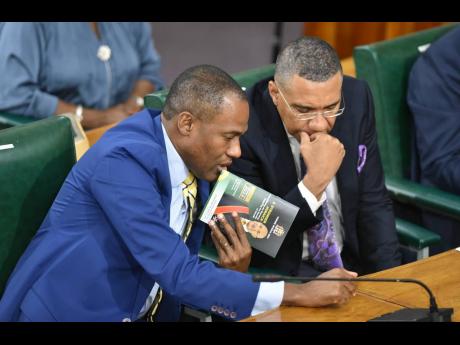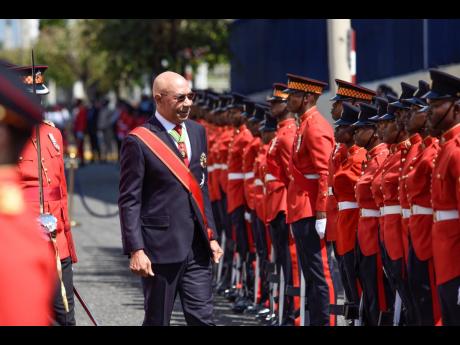NO FEAR
Teachers vow not to be bullied by wage deadline; Clarke says no room for change in next Budget
The 25,000-strong Jamaica Teachers’ Association (JTA) has signalled that it will not be “strong-armed” by the Government into signing the compensation restructuring agreement by the end of the current fiscal year in March. JTA President La Sonja...
The 25,000-strong Jamaica Teachers’ Association (JTA) has signalled that it will not be “strong-armed” by the Government into signing the compensation restructuring agreement by the end of the current fiscal year in March.
JTA President La Sonja Harrison’s remarks come against the backdrop of a six-week deadline outlined by the Government for public-sector workers to ink the compensation deal or risk receiving payments about a year from now.
Harrison said the teachers will continue to have talks with the Government to resolve outstanding issues.
“Any well-thinking individual would ensure that they reduce any form of anomalies that this restructuring exercise brings with it,” she told The Gleaner on Tuesday.
“We are wise-thinking people – we are teachers – so we will continue to be diligent and surgical while we understand the importance for the matter to be settled,” she added.
Finance and the Public Service Minister Dr Nigel Clarke announced in Parliament earlier on Tuesday that there was no room in the 2023-2024 Budget for salary payments related to the current financial year.
This means that if public-sector workers are unable to reach an agreement with the Ministry of Finance soon, they will have to wait until the 2024-2025 financial year before they begin to receive those payments.
Clarke said that he was not sending a warning to public-sector workers who had not yet signed the restructuring exercise.
In a Gleaner interview, Clarke said he was providing full information to the public sector.
“With that heavy burden next year, we can only afford to pay 2023 salaries,” he said.
“I just want to make sure that everybody is aware that if we are not able to pay it in this fiscal year, the numbers speak for themselves: There is no room to accommodate 2022-23 and 2023-24 salaries in the same year.”
But Opposition Leader Mark Golding believes that Clarke’s statement was “clearly intended as a warning to try and induce those who are unhappy with the process and the uncertainties around what is on the table”.
In tabling the $1-trillion Budget in Parliament on Tuesday, Clarke said that the largest single item of expenditure is the $338 billion for wages and salaries.
He said it also includes provisions for the second year of implementation of public-sector compensation restructuring.
According to Clarke, that expenditure is approximately $100 billion higher than the wages and salaries for fiscal year 2021-2022 after adjusting for allowances previously captured in programmes.
“It should be abundantly evident that based on what I have just described that there is no room in the upcoming fiscal year for salary payments related to 2022-23 to be made,” Clarke insisted.
The finance minister said he was working feverishly to make himself available to complete negotiations in the remaining weeks of the current financial year.
“Any of these amounts not paid this fiscal year will have to be paid over a number of years beginning in fiscal year 2024-2025,” Clarke said.
“Even if the first time is a ‘no’, we are not deterred. That does not mean that we cannot get to a ‘yes’. There are only a few weeks left, we are available morning, noon, night, weekday and weekend – let’s talk, let’s get it done,” he appealed to public-sector workers yet to sign the agreement.
Clarke told his parliamentary colleagues that members of the political directorate will not receive their compensation payments before other public-sector workers are paid.
“The people have to come before us. We are not in a position to make compensation adjustments until we adjust for the major groups. This may not be convenient, but it is simply a matter of principle,’ said Clarke.
Opposition Spokesman on Finance Julian Robinson said there are still many agencies in the public sector where workers are restive. He said that workers are not only concerned about the compensation they will receive but how they are placed in fresh categories in the new system.
In recent weeks, there has been worker agitation at the Registrar General’s Department, Tax Administration Jamaica, and the Jamaica Information Service.
“In many cases, they still have concerns that when their net salary is calculated, they are going to be worse off than before,” Robinson said.
He said many legitimate questions raised by public-sector workers have not been satisfactorily answered.
The Police Federation representing rank-and-file members of the Jamaica Constabulary Force has not yet signed the compensation agreement.


